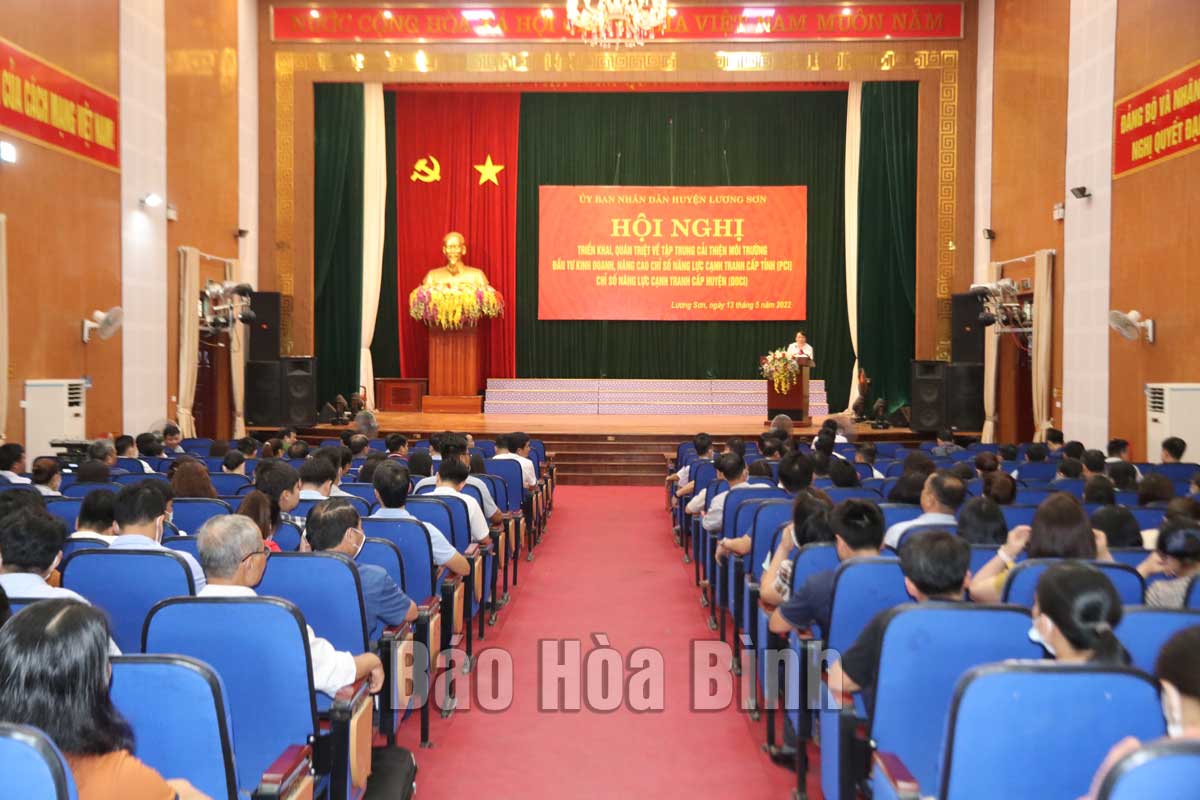
(HBO) – The People’s Committee of Luong Son district held a meeting on May 13 to discuss measures to improve its investment and business environment and increase the provincial competitiveness index (PCI) and district and department competitiveness index (DDCI). The event was chaired by Nguyen Van Danh, Chairman of the district People’s Committee.

An overview of the event.
According to a report delivered at the event, in
2021, Hoa Binh recorded a low PCI at 57.16 points, 5.64 points lower than that
in 2020, ranking 62rd among localities nationwide, dropping 18 positions from
2020.
Meanwhile, Luong Son ranked seventh out of 10
districts and city in Hoa Binh with 71.59 points. Particularly, the district
showed higher performance in three component indices compared to the average
result of the province – the market participation cost; cost for administrative
procedure and law implementation, and business support.
At the event, participants discussed
shortcomings and factors affecting the district’s performance in DDCI in 2021.
Concluding the event, Chairman of the district
People’s Committee Nguyen Van Danh asked local officials and Party members to
promote the achievements and seek ways to deal with current problems, while
improving their sense of responsibility and working coordination in all fields.
They were requested to sign a commitment to fulfilling their assigned tasks.
At the same time, the district should focus more
on personnel training to provide officials for one-stop-shop agencies, while
making socio-economic development information transparent, strengthening the
application of information technology in administrative procedure processing,
he stressed./.
The Standing Board of the Hoa Binh provincial Party Committee has agreed in principle on a proposal by the Standing Board of the Party Committee of Hoa Binh city to gather feedback on the city’s 1:2000 zoning plan, which forms part of its broader urban development strategy.
Hoa Binh province has made notable progress in public administration reform and digital government development, with the satisfaction index among citizens and businesses reaching over 84%, according to recent government evaluations.
Thanks to great efforts by local authorities in recent times, the governance and public administration performance of Mai Chau district has been significantly improved.
In the afternoon of June 6, the Party Committee, the People's Council, the People's Committee and the Fatherland Front of Lac Son district solemnly held a meeting to celebrate the 139th anniversary of the district's founding (1886–2025) and the 79th anniversary of the establishment of the district's Party Committee (1946–2025). There was the attendance of Mr. Bui Van Thang, the Vice Chairman of the Provincial People's Council; Mr. Quach Tat Liem, the Vice Chairman of the Provincial People's Committee; Ms. Dang Bich Ngoc, the Deputy Head of the National Assembly Delegation of the province; as well as the former leaders of the province and district through various periods, who are the natives of the district.
Implementing the Politburo’s Resolution No. 57-NQ/TW on breakthroughs in science – technology, innovation, and digital transformation is a golden opportunity for the northern mountainous province of Hoa Binh to renew growth model, improve competitive edge and shorten digital gap.
Resolution 57-NQ/TW, issued by the Politburo on December 22, 2024, identifies sci-tech, innovation, and digital transformation as strategic breakthroughs to build a developed and prosperous nation. In Hoa Binh province, this spirit is not just a slogan, it’s being put into action through concrete initiatives that form a "new development triangle”: digital citizenship, digital economy, and digital administration.



